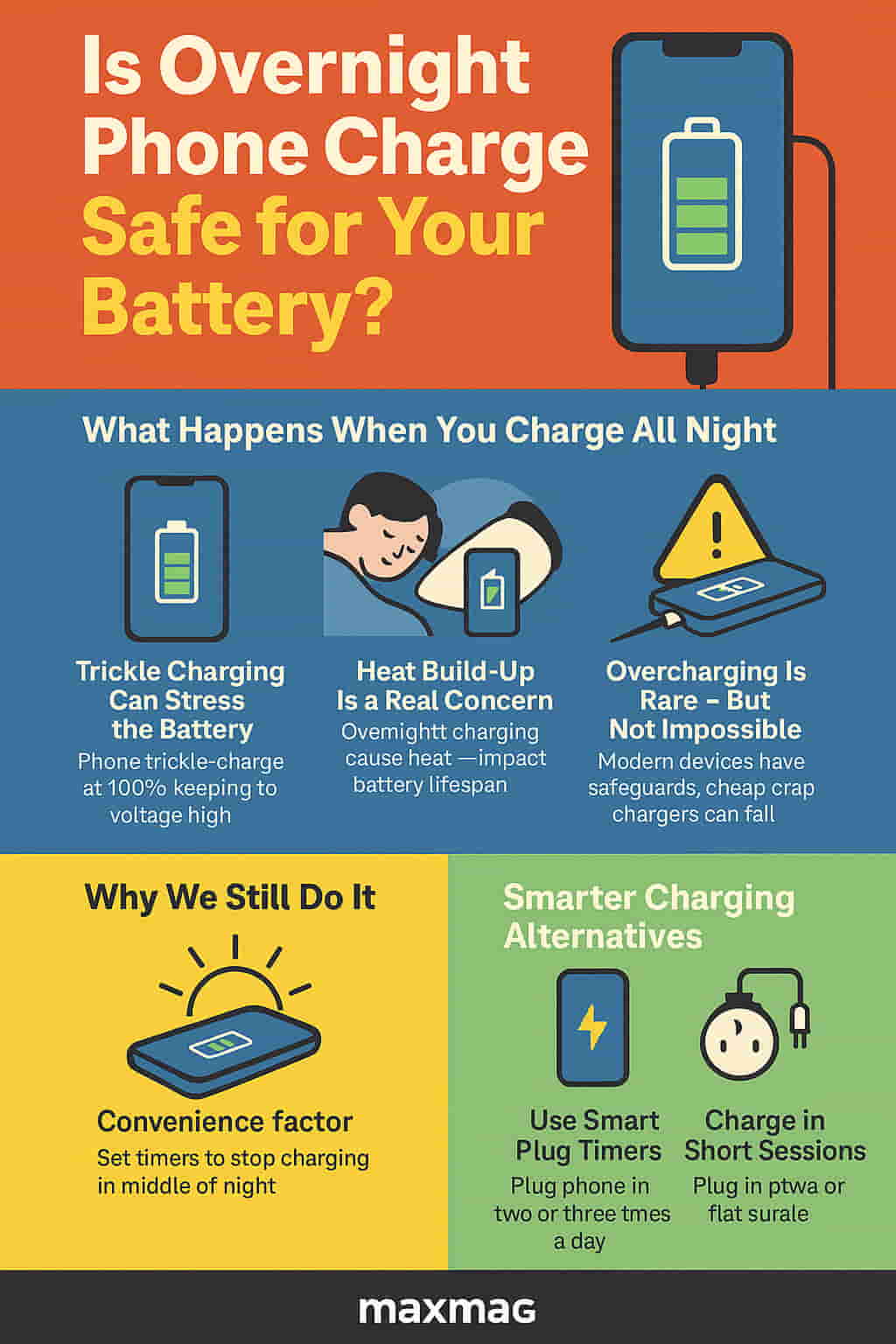
Each night, millions of people around the world do the same thing: they plug in their smartphone before going to bed. It’s a habit so ingrained that we barely think twice. But a growing number of experts are raising an important question—is overnight phone charging actually safe for your device? While it seems convenient to wake up to a full battery, this habit might be doing more harm than good in the long run.
Let’s take a closer look at what happens to your phone’s battery overnight, whether you should change your habits, and what you can do to protect your device’s longevity—without sacrificing convenience.
How Phone Batteries Work: The Basics
Modern smartphones mostly use lithium-ion batteries. These are highly efficient, lightweight, and capable of delivering strong power output for years—if cared for properly. However, they’re also chemically sensitive and subject to degradation over time.
Every time you plug in your phone, ions move from one side of the battery to the other. Over hundreds of charge cycles, these movements can weaken the battery’s structure. Heat and overcharging accelerate this process.
Many users believe that overnight phone charging is harmless because the phone “knows when to stop charging.” While that’s partially true, it’s not the full story.
What Really Happens When You Charge All Night
1. Trickle Charging Can Stress the Battery
Once your phone reaches 100%, the charger doesn’t simply “turn off.” Instead, it switches into a trickle charge mode that periodically tops off the battery to keep it full. This keeps the battery in a high-voltage state for hours—something lithium-ion cells don’t tolerate well. Over time, this leads to chemical wear.
According to a guide published by Battery University, leaving your phone at 100% charge for extended periods increases voltage stress and accelerates degradation.
2. Heat Build-Up Is a Real Concern
Charging produces heat, and heat degrades batteries. When you leave your phone on a soft surface—like a bed or pillow—it can trap that heat. This causes temperatures to rise slowly overnight. Even small increases in heat can dramatically shorten battery lifespan, especially when repeated daily.
The Environmental Protection Agency (EPA) warns that excessive heat not only damages electronics but also increases the risk of fire hazards. Keeping your phone cool is a key step in maintaining both performance and safety.
3. Overcharging Is Rare—But Not Impossible
Modern devices have mechanisms to prevent “true” overcharging. However, cheap or non-certified third-party chargers may bypass these protections. If your charger malfunctions, the phone could be exposed to more voltage than it’s designed to handle.
As Consumer Reports highlights, it’s best to use chargers from the original manufacturer or ones that have undergone safety certification.
Why We Still Do It: The Convenience Factor
Despite these risks, overnight phone charging remains a global habit for one simple reason—it’s easy. It fits into our routines, doesn’t interrupt our day, and ensures that we start the morning with a full battery.
Even manufacturers acknowledge that some users will always prefer convenience. That’s why many have introduced software-based charging optimizations. For example:
-
iPhones use “Optimized Battery Charging” to delay topping off the battery until just before your wake-up alarm.
-
Samsung and Pixel devices offer similar adaptive charging features.
-
Some smart chargers now stop at 80% automatically, helping preserve battery life.
These innovations offer a middle ground—allowing you to continue overnight phone charging without severely damaging the battery.
The Science of Battery Degradation
Battery health is typically measured in charge cycles—a full 0 to 100% charge counts as one cycle. Most phones are rated for 300 to 500 full cycles before losing 20% of their capacity. That means if you’re charging to 100% every day, you’ll hit this limit in just over a year.
According to PCMag, one of the best ways to extend battery life is to keep the battery charged between 20% and 80% rather than letting it go all the way to full each night. Doing so slows down chemical aging and avoids voltage stress.
When Overnight Charging Might Be Okay
If you’re using a modern, certified charger and your phone has adaptive charging enabled, overnight phone charging might not be harmful in the short term. The impact depends on:
-
Your device model
-
Charger quality
-
Room temperature
-
Charging surface
-
Software settings
For example, if your phone delays charging until just before you wake up, the battery doesn’t spend hours at 100%. That’s a win. But if you’re charging with a hot cable in a warm room on a blanket, you’re compounding risks.
Smarter Charging Alternatives
Looking for better ways to charge? Here are practical strategies to maintain battery health:
Use Smart Plug Timers
These inexpensive gadgets plug into your outlet and can cut off power after a set number of hours. You could start charging at 11 p.m. and have the plug turn off at 1 a.m.—enough time for an 80% charge.
Charge in Short Sessions
Try topping up your phone during the day—instead of relying solely on overnight phone charging. A 30-minute charge in the morning and another during lunch keeps you in the optimal range without stress.
Enable Optimized Charging
Most phones now offer software options that adapt charging speeds and timing based on your usage. Go into your battery settings and enable this—it’s one of the easiest steps to prolong battery life.
Keep It Cool
Charge your phone in a cool, ventilated area. Avoid thick cases or soft surfaces that trap heat. A flat table or desk is best. As CNET recommends, battery longevity is significantly improved when devices are kept in cooler temperatures.
Common Myths About Charging
❌ Myth 1: My phone stops charging at 100%, so it’s safe
✅ Truth: It stops charging but trickle charges resume every time the battery drops slightly, adding unnecessary cycles.
❌ Myth 2: Wireless charging is better overnight
✅ Truth: Wireless chargers often produce more heat, especially when left running all night.
❌ Myth 3: Fast charging ruins batteries
✅ Truth: Fast charging creates more heat, but if used occasionally with certified chargers, it’s safe.
Environmental Impact
Beyond personal use, frequent battery replacements contribute to environmental damage. Improper disposal of lithium batteries can result in chemical leakage and fires. The U.S. Department of Energy has emphasized the importance of prolonging battery life to reduce demand for raw materials and reduce waste.
By reducing unnecessary overnight phone charging, users can minimize the frequency of battery replacements—thereby helping curb e-waste.
Final Verdict: Should You Stop Charging Overnight?
If you prioritize convenience and own a newer device with smart charging enabled, overnight phone charging probably won’t kill your battery overnight. However, it still accelerates battery aging over time.
If your goal is longevity and sustainability, switch to partial day charges and keep your battery in the 20–80% range. This simple shift can add months—or even years—to your phone’s lifespan.
❓ FAQ
Q: Is charging overnight really that bad?
A: It’s not catastrophic, but repeated nightly full charges can reduce battery life due to voltage stress and heat.
Q: How do I stop my phone from charging to 100%?
A: Enable “Optimized Charging” in your battery settings if supported. Some Android devices offer caps at 80%.
Q: Should I avoid wireless charging altogether?
A: Not necessarily, but limit overnight use. Wireless pads often cause more heat buildup than wired charging.
Q: Is fast charging worse than overnight charging?
A: Fast charging is more intense but short. Overnight charging holds your phone at 100% for hours. Both have trade-offs.
Q: What’s the safest way to charge my phone?
A: Use a certified charger, keep your phone cool, and charge during the day to around 80%.





